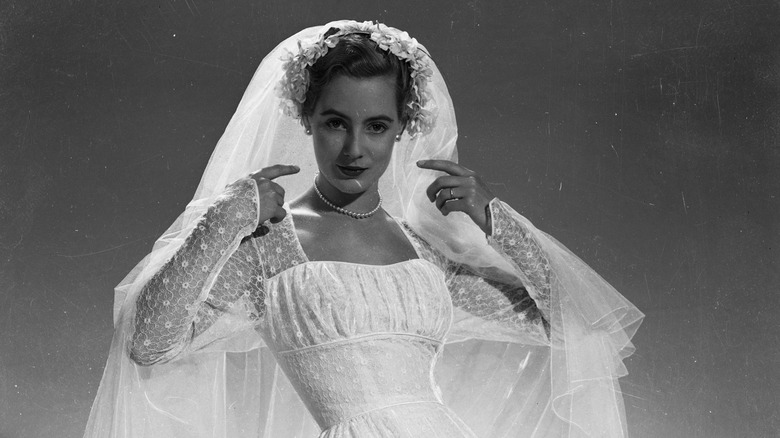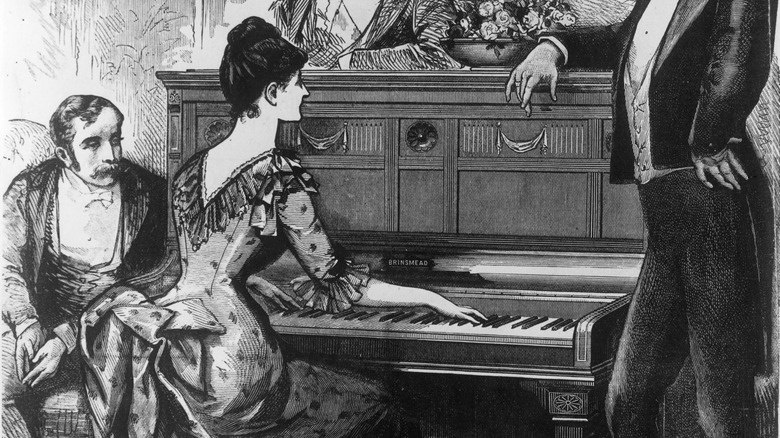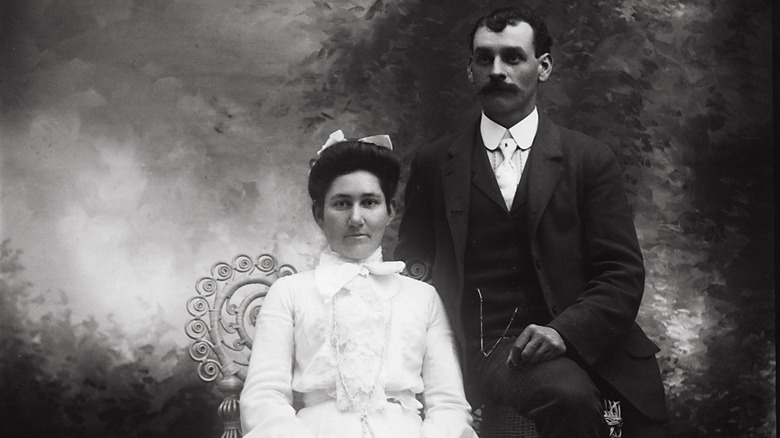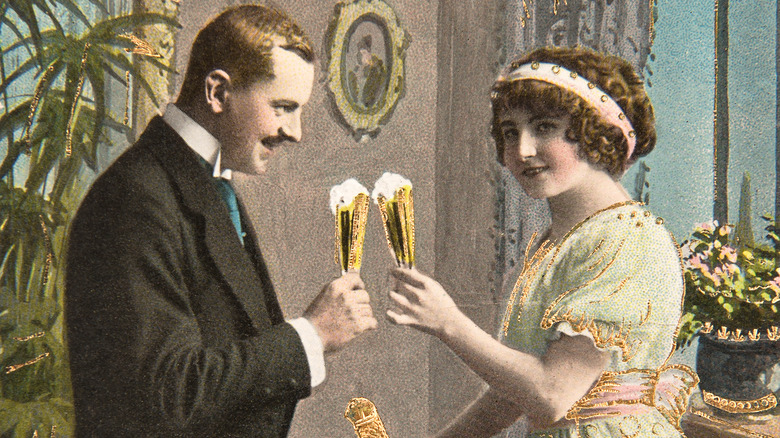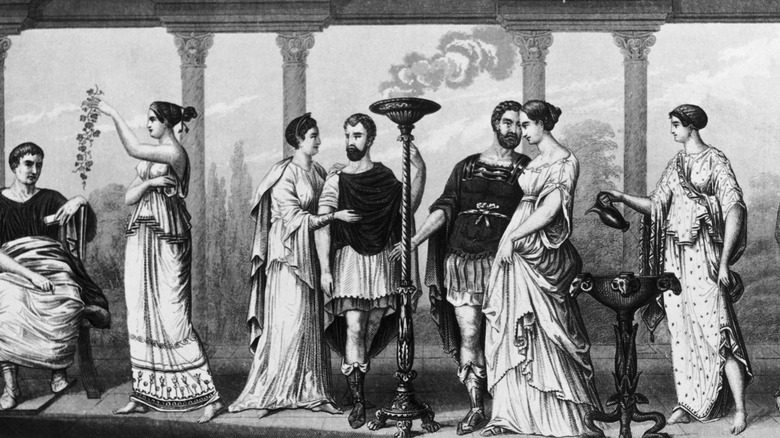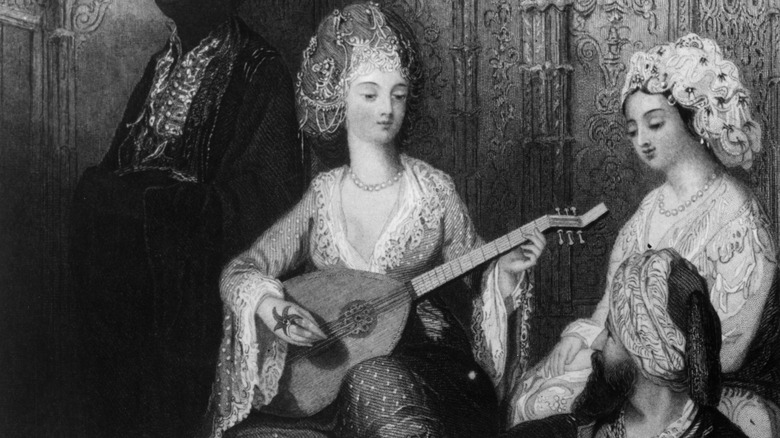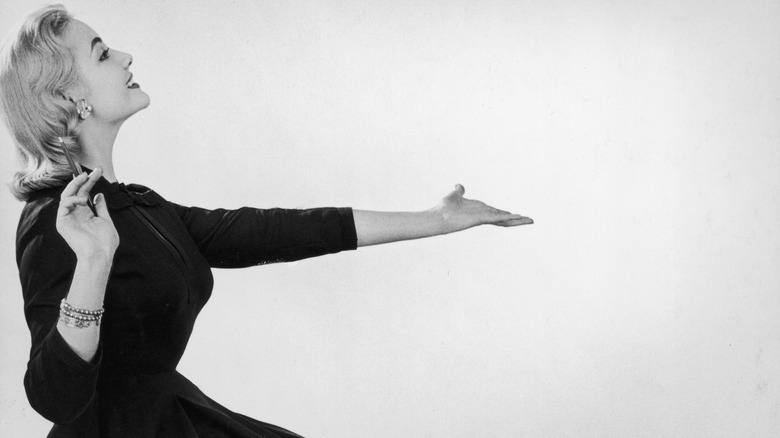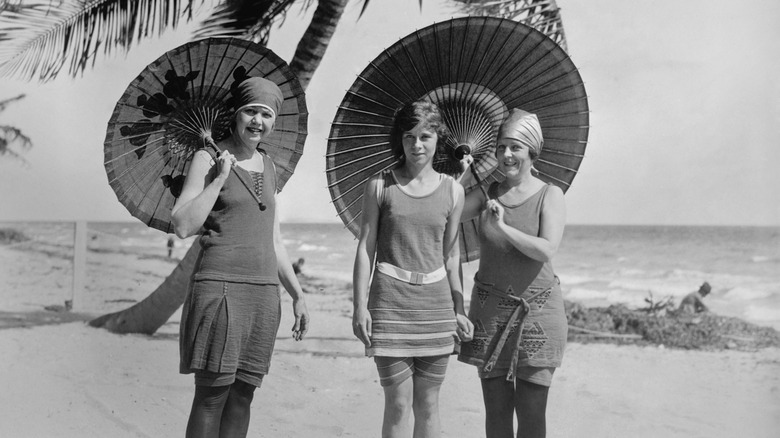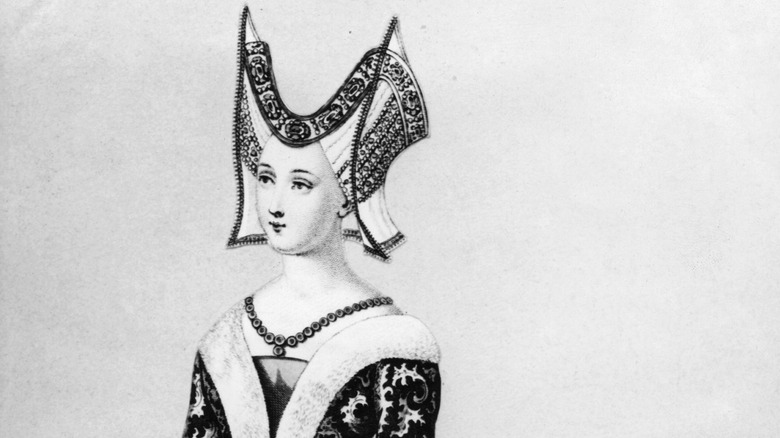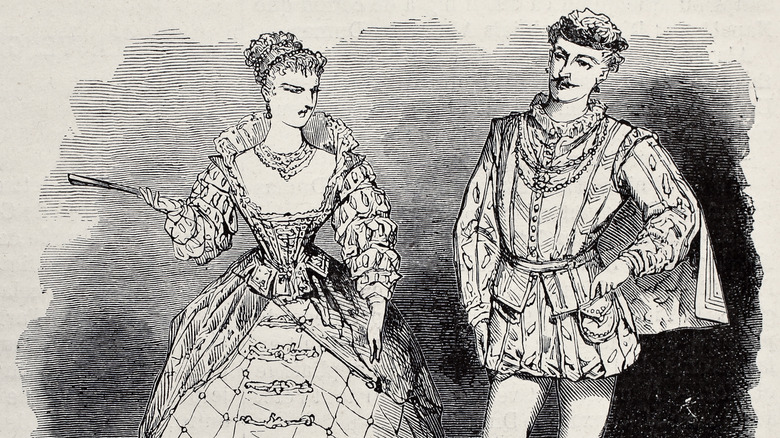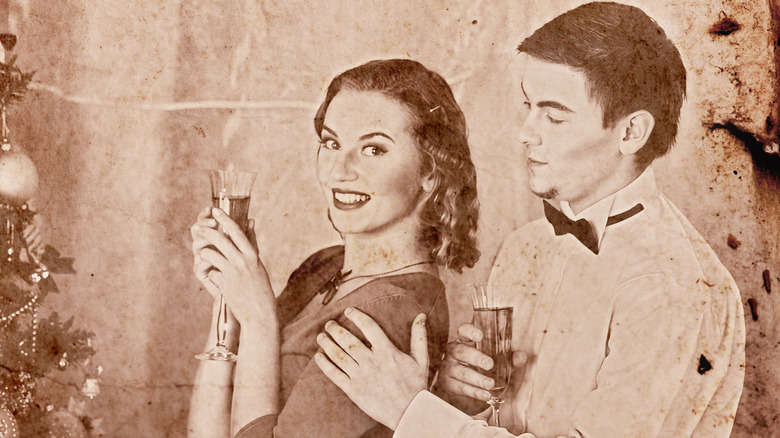Marriage And Dating Advice Given To Women Throughout History
Relationships are hard. A stroll down the magazine aisle of any store will reveal headlines promising how to attract a partner, and how to keep them happy. Such advice is nothing new — relationships have never been easy, and romantic advice dates as far back as actual romance. While modern women might think that dating and marriage are difficult fields to navigate, in most cases we have it easier than our ancestors did. Dating and marriage advice over the centuries has been dodgy at best. Much of it centers not on how to have a happy, balanced relationship, but on how to please a man.
For much of history, women were raised primarily to be wives and mothers, and that is reflected in historical dating advice. If you think 21st century love is a tricky thing, just imagine living in days gone by when women were expected to be little more than pretty ornaments who existed to serve their husbands. Take a look at some of the strangest dating and marriage advice given to women throughout history.
Don't forget to practice elegant accomplishments
For most of history, women were not expected to be as educated as men were, but they were expected to have a certain set of accomplishments that would make them good homemakers. In the 19th century, women in more affluent socioeconomic classes were expected to be trained in artistic disciplines in order to show that they were well-bred. These "elegant accomplishments" included a variety of artistic forms including music, dancing, and creating and arranging wax flowers. In Letters to Young Ladies on Their Entrance Into the World, written by Mrs. Lanfear, women were reminded to be a credit to their husbands and to make their lives as comfortable as possible.
The letters, published in 1824, told wives to make sure that their husband's time at home was "pleasant and agreeable." They were told not to "give up or neglect to practise... music, drawing, or any other elegant accomplishment which he admires."
Wear pretty ribbons
Women throughout history were expected to maintain their appearance at all times, especially when their husbands were around. It was part of their duty to their spouses to be pleasing to look at. In 1901, Emma Frances Angell Drake's What a Young Wife Ought to Know was published. In it, she told women of the importance of maintaining one's appearance after marriage. "The pretty dress, the color of the ribbon, the manner of dressing the hair, are... chosen deliberately because she knows they are pleasing to him," she wrote.
According to Drake, taking care of your appearance is important in order to attract a man, but it is vital to a marriage — that is, if you want to keep your husband. "Not less but more care is needed to retain the love and the respect of the man of her choice, than to win it," wrote Drake.
Be wary of lounge lizards
In the early 20th century, it was expected that most women would marry. Modern dating as we know it had yet to become common practice. While arranged marriages had mostly died out (at least in the Western world), courtship was a tricky process. Men and women typically were not allowed to be alone with each other and were chaperoned throughout the courtship process.
This made getting to know a prospective suitor a delicate task. In 1918's Womanhood and Marriage, Bernarr MacFadden, the man who staged America's first bodybuilding contest, offered women advice on how to choose a husband. "Let her choose, then, first of all a MAN in every sense of the word," wrote MacFadden. "Not a mere appendage to a cigarette; not a lounge lizard; not a perambulating stock-ticker; not a whited sepulchre of disease and corruption; but a man who is physically strong, mentally alert, morally pure and clean and upright."
Your only friends should be your husband's friends
Today, it's expected that a couple have separate interests and their own group of friends. In fact, maintaining a sense of self is an important part of a balanced relationship. Things were a bit different in ancient times, though, when women's lives were expected to center around their husbands. In the Moralia, ancient Greek and Roman philosopher Plutarch offered marriage advice. He told women that, upon marriage, a woman's life ceases to be her own. "A wife ought not to make friends of her own, but to enjoy her husband's friends in common with him," he wrote.
Plutarch also told women that they should adopt their husband's religion and abandon their own. "The gods are the first and most important friends," he said. "Wherefore it is becoming for a wife to worship and to know only the gods that her husband believes in, and to shut the front door tight upon all queer rituals and outlandish superstitions. For with no god do stealthy and secret rites performed by a woman find any favour."
Prepare yourself for disappointment
Getting married? You'd better temper your expectations. This advice comes from none other than George Washington himself. The first president of the United States, Washington wasn't just one of the Founding Fathers of the nation but also a doting father and grandfather. Love, Washington warned his granddaughter Betsey in a letter written in 1794, is a fleeting thing. While his intent was to warn Betsey not to get caught up in the romance of falling in love, but to find a well-suited partner, his words come across as a bit cynical.
Washington wrote: "Love is a mighty pretty thing; but like all other delicious things, it is cloying; and when the first transports of the passion begins to subside, which it assuredly will do, and yield — oftentimes too late — to more sober reflections, it serves to evince, that love is too dainty a food to live upon alone... "
Instead, Washington urged his granddaughter to find a sensible man who could support her once their passion inevitably faded. If a man did not have such "good dispositions," Washington warned that "whatever may be your first impressions of the man, they will end in disappointment."
Play dumb
By the mid 20th century, more and more women were obtaining college degrees, but they were still expected to defer to men. "The average man marries a woman who is slightly less intelligent than he is," said a supplement in a 1952 issue of Modern Bride (via Jezebel).
The supplement, a condensation of Preparing for Marriage by marriage counselor Dr. Clifford R. Adams, said that intelligent women who don't play dumb risk staying single. "That's why many brilliant women never marry," wrote Dr. Adams. "They do not come in contact with sufficiently brilliant men, or fail to disguise their brilliance in order to win a man of somewhat less intelligence. College males tell us that they want a girl for a wife who is intelligent but makes them feel they are still more intelligent!"
While college tuition in the 1950s was significantly cheaper than it is today, going to school just to spend your life making a man feel smart seems like a waste of money. Then again, women weren't really expected to use their degrees in an actual career. Instead, they were supposed to "read books on how to prepare tasty dishes and how to rear children according to the best principles of child care."
Know the scientific names for your lady bits
Women in the early twentieth century were expected to be demure and refined. While education was an indicator of class, there were certain things that parents didn't want their daughters to know. Knowing the finer points of anatomy and human reproduction was something that many young woman at the turn of the century were ignorant of, but Maurice Alpheus Bigelow, a biology professor, said that they should be better educated about their own bodies.
"An adolescent girl of fourteen to sixteen should know the general plan of her own sexual structure," Bigelow wrote in Sex-education: A Series of Lectures Concerning Knowledge of Sex in Its Relation to Human Life published in 1916. He believed some knowledge was important "because dignified names help attitude," but warned against "detailed description of the external organs" which "might arouse curiosity that leads to exploration."
Thus, a woman's knowledge of her body should be limited to the uterus, vulva, vagina, Fallopian tubes, and ovaries. It would be a few decades before Dr. Ernst Grafenberg described and named the G-spot, but we're pretty sure Bigelow wouldn't have approved of teaching women about it.
Don't be frolicsome, forward, or boisterous in speech
Christine de Pisan (1364-c.1430) is a notable figure in women's history. In a time when women of gentle birth were expected to do little more than raise families and serve their husbands, de Pisan was a prolific writer who began publishing poetry to support herself after the death of her husband. She wrote some of the earliest feminist texts and is remembered for her advancement of gender equality.
While she may have believed in the equality of the sexes, de Pisan still encouraged ladylike behavior. In The Treasure of the City of Ladies: Or the Book of the Three Virtues, she wrote about proper etiquette at court. "The women should restrain themselves with seemly conduct among knights and squires and all men," wrote de Pisan. "They should speak demurely and sweetly. ... They must not be frolicsome, forward, or boisterous in speech, expression, bearing or laughter. They must not go about with their heads raised like wild deer."
Get your husband's consent before naming your children
Women in the seventeenth century had limited rights under the law, but societal expectations made their lives even more restrictive. Treated as second-class citizens, they were born under the control of their fathers, and then that control was transferred to their husbands. William Gouge's 1622 text, Of Domestical Duties, laid out a woman's responsibilities in the home. Gouge, a clergyman, believed that God had created women to be inferior to men and therefore women must submit to their husbands. This attitude was widespread at the time.
A woman's duty was to her husband and to her children, and Gouge makes it clear that a wife must defer to her husband in all things. Even raising children, something that was considered to be a womanly task, required permission from the man of the house. "A wife may not simply without, or directly against her husband's consent, order and dispose of the children in giving them names, appareling their bodies, appointing their callings, places of bringing up, marriages or portions," wrote Gouge.
Virtually any woman can get her man if she will just stalk him long enough
Dating is hard. If you're having trouble finding a partner, there is one method that is sure to get you one (at least according to this 20th century dating advice): stalking. Scott Coltrane examined 20th century advice columns in the book Gender and Families. In it, he shared advice from columnist Dorothy Dix (the pen name of Elizabeth Meriwether Gilmer), who wrote Advice for the Lovelorn from 1900 to 1950.
Dix's advice was influential in the early 20th century, and much of it concerned how to snare a husband. "The girl who wants to catch a man dangles before him the charms which he prefers and at which he is most likely to bite," wrote Dix. "Of course she makes herself as good-looking as nature and the style shop permits. Then she proceeds to... cultivate a line that will appeal to the particular man on whom she has an eye." Dix concluded that in this manner, any woman can get the man of her dreams. "Virtually any woman can get her man if she will just stalk him long enough," she said.
